新编实用英语第二册(第四版)unit 1说课材料
新编实用英语综合教程2unit_1_教案
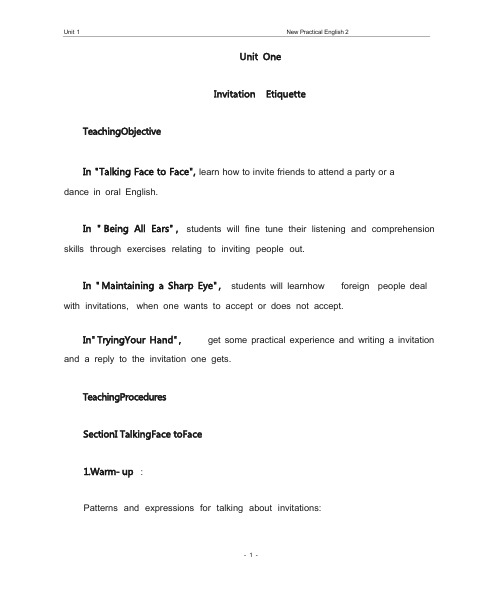
learn how to invite friends to attend a party or adance in oral English.students will fine tune their listening and comprehensionskills through exercises relating to inviting people out.students will learnhow foreign people dealwith invitations,when one wants to accept or does not accept.get some practical experience and writing a invitationand a reply to the invitation one gets.:Patterns and expressions for talking about invitations:I’dliketoinviteyoutodinner.我想请你吃晚饭。
Why don’t you come and join us for disco?你为什么不和我们一起跳迪斯科?It’s very kind of you to invite me.谢谢你邀请我。
How nice of you! Many thanks.你真好!多谢。
I’dlove to. That wouldbe grea t.我很愿意去。
太好了!Oh, dear, I’m afraid I’m busy tonight. Perhaps tomorrow evening?哦,亲爱的,今晚我很忙。
明晚也许可以吧?Could you make it another time, perhaps next Sunday?你能改个时间吗,下个星期天怎样?It’s very kind of you, but you see I’ll have to prepare for my exam.非常感谢,可你知道我得准备考试。
新编实用英语综合教程第二册第一单元
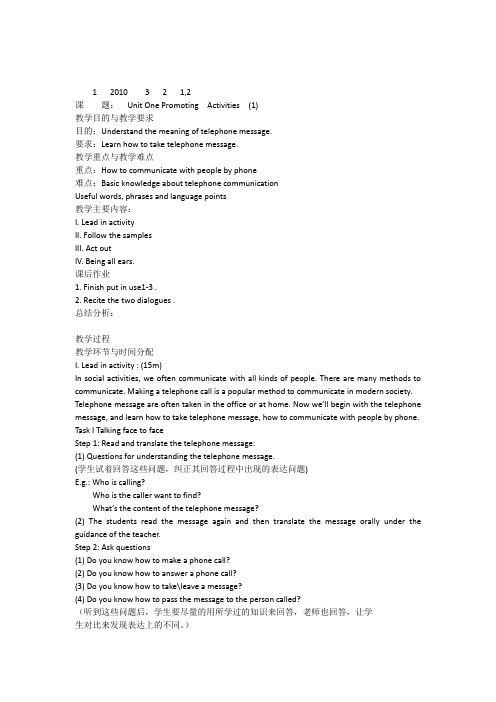
1 2010 32 1,2课题:Unit One Promoting Activities (1)教学目的与教学要求目的:Understand the meaning of telephone message.要求:Learn how to take telephone message.教学重点与教学难点重点:How to communicate with people by phone难点:Basic knowledge about telephone communicationUseful words, phrases and language points教学主要内容:I. Lead in activityII. Follow the samplesIII. Act outIV. Being all ears.课后作业1. Finish put in use1-3 .2. Recite the two dialogues .总结分析:教学过程教学环节与时间分配I. Lead in activity : (15m)In social activities, we often communicate with all kinds of people. There are many methods to communicate. Making a telephone call is a popular method to communicate in modern society. Telephone message are often taken in the office or at home. Now we’ll begin with the telephone message, and learn how to take telephone message, how to communicate with people by phone. Task I Talking face to faceStep 1: Read and translate the telephone message:(1) Questions for understanding the telephone message.(学生试着回答这些问题,纠正其回答过程中出现的表达问题)E.g.: Who is calling?Who is the caller want to find?What’s the content of the telephone message?(2) The students read the message again and then translate the message orally under the guidance of the teacher.Step 2: Ask questions(1) Do you know how to make a phone call?(2) Do you know how to answer a phone call?(3) Do you know how to take\leave a message?(4) Do you know how to pass the message to the person called?(听到这些问题后,学生要尽量的用所学过的知识来回答,老师也回答,让学生对比来发现表达上的不同。
新编实用英语第二册(第四版)unit-1PPT课件

I’d like to invite you to come to my birthday party. Would you
Good. Will you come at 7:00
like to join us
npsarty. How would you like to join us?
William: Great. That would be
. Congratulations !
2) Inviting friends to a dinner Mary: We’d love to have you over for dinner Saturday.
to take you somewhere really special. Cindy: Oh, thanks, but ... maybe some other time. I’m very
busy tonight.
滑旱冰
Back
6 Unit | One
Window on Key Words
2 Work in pairs and perform the tasks by following the above mini-talks. Refer to the Data Bank in the Workbook for relevant expressions.
ห้องสมุดไป่ตู้
3) Inviting friends to a movie Paul: What’re you doing on Saturday night?
Molly: I’m not sure. Why? Paul: Well, I was thinking of asking you to go to a movie with me this weekend.
【英语】精编高教社新编实用英语第二册第一单元教案
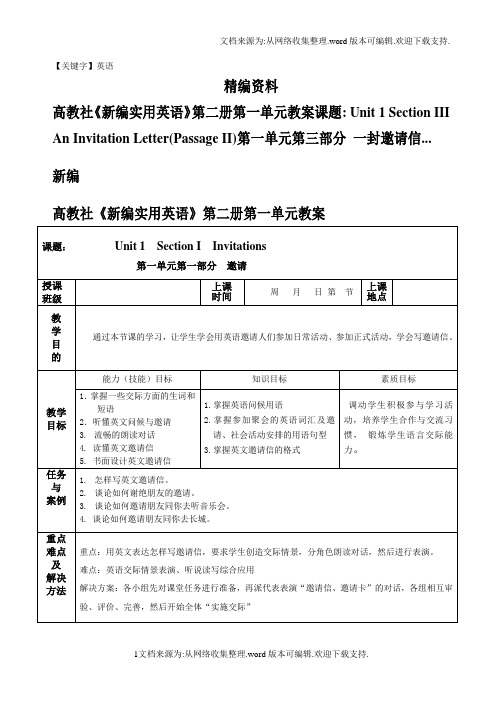
Would you like to go skating with me this afternoon?
介绍与反馈:
Thank youfor theinvitation
I will if I can.
Thatwould be super.
I love to, but…
收集更多关于参加聚会的英语词汇及邀请、社会活动安排的用语句型,进行情景对话表演。
学生制作的
邀请卡
20分
归纳与
综合训练
创造情境
借助邀请卡进行对话的观摩、归纳与评价
部分学生
交际实践
5分
总结与讲评
讲评本单元话题听、说、读、写
写邀请信、邀请卡等注意事项
修正邀请信,揣摩语言行为方式
作 业
1.搜集、掌握更多有关邀请信、社会活动的英语词汇、句型。
1) accept(v.)—acceptance(n.)
2) decline—accept(antonymy.)
3) refuse(v.)—refusal(n)
2.综合训练
1)流畅的朗读课文
2)根据课文回答问题
3)复述课文
4)总结美国人的邀请习俗
专业:班级:
高教社《新编实用英语》第二册第一单元教案
课题:Unit 1 Section III An Invitation Letter(Passage II)
第一单元第三部分 一封邀请信
授课
班级
上课
时间
周 月 日 第 节
上课
地点
教
学
目
的
通过表示邀请的英语词汇、短语、句型的搜集,进行此话题写作能力的训练,掌握邀请信的格式,使学生能够用英文表达邀请、感谢。
新编实用英语综合教程2第四版-PPT精品课件
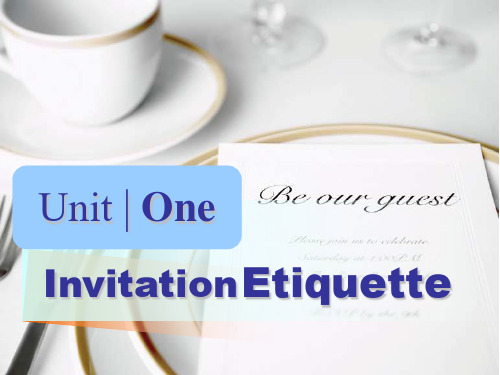
1 Unit | One
Unit Goals:
What You Should Learn to Do
1. Make an oral invitation to: invite people to join daily activities invite people to formal occasions
1 Work in pairs. Look at the picture and recite the following mini-talks for making invitations and giving responses.
1) Inviting friends to a party Sally: Hello, William. What’re you going to do tomorrow evening?
2) Inviting friends to a dinner Mary: We’d love to have you over for dinner Saturday.
Robert: Oh, thank you. What time should I come? Mary: How about eight o’clock?
2. Make a written invitation (write an invitation card or a letter) for: personal invitation official occasions
3. Give a reply to: an oral invitation a written invitation
Speak and Perform
新编实用英语综合教程2第四版 课件

Section Ⅲ
Contents
Section Ⅴ
Appreciating Culture Tips
Section Ⅳ
Maintaining a Sharp Eye
Trying Your Hand
Unit | One
Section I Talking Face to Face
Back
Unit | One
Back
Unit | One
Following Sample Dialogues
Imitate and Perform
4 Read the following sample dialogues and try to perform your own tasks.
1) Inviting Friends to a Party
2. Make a written invitation (write an invitation card or a letter) for: personal invitation official occasions
3. Give a reply to: an oral invitation a written invitation
1 Work in pairs. Look at the picture and recite the following mini-talks for making invitations and giving responses.
1) Inviting friends to a party Sally: Hello, William. What’re you going to do tomorrow evening?
新编实用英语综合教程二Unit-1-Invitation-EtiquettePPT演示课件
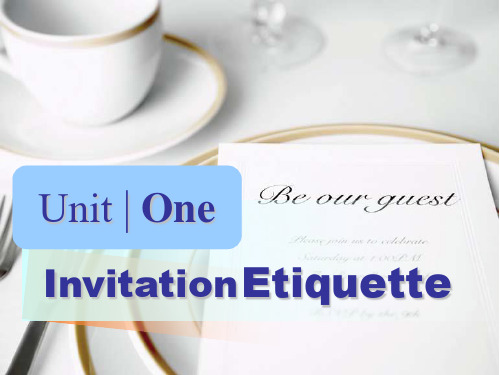
Robert: OK. Thank you for inviting me.
5
Back
Unit | One
3) Inviting friends to a movie Paul: What’re you doing on Saturday night?
Molly: I’m not sure. Why? Paul: Well, I was thinking of asking you to go to a movie with me this weekend.
Unit | One
Invitation Etiquette
1
Unit | One
Unit Goals:
What You Should Learn to Do
1. Make an oral invitation to: invite people to join daily activities invite people to formal occasions
Putting Language to Use
Speak and Complete
Speak and Translate
Speak and Communicate
4
Unit | One
SECTION I Talking Face to Face
Imitating Mini-talks
Speak and Recite
William: Tomorrow evening? Nothing special. Sally: I’m inviting a few friends to my daughter’s birthday party. How would you like to join us?
新编实用英语综合教程2-Unit1InvitationEtiquette教案

Unit 1 Invitation EtiquetteUnit GoalsWhat you should learn to doMake an oral invitation to:Invite people to join daily activitiesInvite people to formal occasionsMake a written invitation(write an invitation card or a letter) for:Personal invitationOfficial occasionsGive a reply to:An oral invitationA written invitationWhat you should know aboutInvitation culture: western and ChineseWord order in a subordinate clauseRequirements:After learning this unit, students should grasp:1. Read and understand the meaning of invitation cards and letters2. How to write invitation cards and letters and remember the patterns of invitation cards and letters3. How to invite people to party or dinner, and how to accept and decline invitations4. The customs of inviting people in different countries5. Important words, phrases and language points in the passageIn our daily life, we need to invite others to dinner or take part in all kinds of parties, so we should know about western custom about invitation.Foreign custom is much stricter than Chinese custom in the matter of replying to invitations. When you receive an invitation you should answer is immediately, saying definitely whether you are able to accept it or not.If the invitation is given by word of mouth, in conversation or at a chance meeting, you should answer at once whether you can come or not. If you cannot give an answer at that time, you may say “ May I let you know this evening ” or some such words. By studying this unit, we will know about how to invite the others, how to accept or decline the invitation, and how to write invitation cards/letters.Section I Talking Face to Face1. Imitating Mini-Talks2. Acting out the Tasks3. Studying Email Information on the Internet4. Following Sample Dialogues5. Putting Language to UseSection II Being All Ears1. Learning Sentences for Workplace Communication2. Handling a Dialogue3. Understanding a Short Speech / TalkSection III Trying your Hand1. Practicing Applied Writing2. Writing Sentences and Reviewing GrammarSection IV Maintaining a Sharp EyePassage 1 :Information Related to the Reading PassageWhether it is to a wedding, a dinner party, shower or gala event, an invitation comes with some important obligations. Here's a quick guide to keep you on the guest list.1. R.S.V.PFrom the French “ R |oondez, s il vous plait ” , it means “ Please reply” Thislittle code has been around for a long time and it ' s definitely telling you that your hosts want to know if you are attending. Reply promptly, within a day or two of receiving an invitation.2. How do I respond? Reply in the manner indicated on the invitation.R.S.V.P and no responsecard: a handwritten responseto the host at the return address on the envelope.Response Card: fill in and reply by the date indicated and return in the enclosed envelope.R.S.V.P with phone number: telephone and make sure to speak in person —answering machines can be unreliable.R.S.V.P with e-mail: you may accept or decline electronically.Regrets only: reply only if you cannot attend. If your host doesn' t hear from you, he is expecting you!No reply requested?Unusual, but it is always polite to let someone know your intentions. A phone call would be sufficient.3. Is that your final answer?Changing a“yes” to a“no” is only acceptable on account of: illness or injury, a death in the family or an unavoidable professional or business conflict. Call your hosts immediately.Canceling because you have a “better” offer is a surefire way to get dropped from ALL the guest lists.Being a “ no show” is unacceptable.Changing a “ no” to a “yes” is OK only if it will not upset the hosts' arrangements.4. “May I bring , ?”Don' t even ask! An invitation is extended to the people the hosts want to invite —and no one else., a date. Some invitations indicate that you may invite a guest or date (Mr. John Evans and Guest) and when you reply, you should indicate whether you are bringing someone, and convey their name., my children. If they were invited, the invitation would have said so., my houseguest. I't s best to decline the invitation, stating the reason. This gives your host the option to extend the invitation to your guests, or not.5. Say “ Thank You.”Make sure to thank your hosts before you leave, and then again by phone or note the next day.Text Business InvitationA case of mistaken identity!Don' t worry, we' ve been assured that this mystery will besolved in time for ourHoliday Office PartyWe' re leaving the investigation to those who do it best.Let' s get away from all those computers, papers and mess and cometo our office party in your best suit or dress.Come join us and Toast the SeasonThursday, December 9th 2010 5:00 P.M.The Columbia House - Pen thouse Floor 485 Jeffers on PlazaLeonard, Barley, Travis, Bailey and SmithRegrets only to Dianne 248-8522It would be a crime to miss our party or not be on time485 Jefferson PlazaBusiness invitations can be informal or formal. Although invitations are usually sent through the mail, informal invitations such as e-mail and phone invitations are becoming more acceptable.Invitation TimingFor most formal occasions, it's best to invite guests three or four weeks in advance. If you choose to invite your guests by phone, remind them again in writing two weeks before the gathering. Here are a few guidelines for your information: • Six to eight months before an important seminar to which out-of-town executives are invited.• Four weeks before an evening reception.• Two to four weeks before a cocktail party.Invitation FormatFormal business invitations are most commonly printed on white or off-white high-quality paper. Acompany can use any color of paper it desires, as long as it upholds and promotes the compan'y s image.With preprinted invitations, you simply fill in the blanks to tell what, where, and when the party will be and who is giving it. It 's also acceptable to include an RSVP notation and your phone number or address on the invitation for more accurate planning.Responding to an InvitationEither use the address or phone number printed in the lower left corner of the invitation or return the RSVP card sent with the invitation. If a “Please reply by” a given date is included in the invitation, be polite enough to reply by that date. If the words “Regrets only” are printed in the lower left corner of the invitation, you need only to inform the host if you will not be able to attend. If your host does not hear from you, you are expected to attend.Never ask to bring a guest unless the invitation states“Mr. Louis Winthorp and Guest.” Most likely, the host will have only enough food and drinks for the number of people he invites. Showing up with an uninvited friend could turn out to be an embarrassing situation for everyone.Language Points1 Explanation of Difficult Sentences1. (Para. 1) Although invitations are usually sent through the mail, informal invitations such as e-mails and phone invitations are becoming more acceptable. Analysis: such as means“of the same kind, like” and should be followed by nouns or noun phrases.Translation: 虽然邀请函通常通过信函方式发出,但目前像电子邮件、电话邀请等非正式邀请越来越被普遍使用。
- 1、下载文档前请自行甄别文档内容的完整性,平台不提供额外的编辑、内容补充、找答案等附加服务。
- 2、"仅部分预览"的文档,不可在线预览部分如存在完整性等问题,可反馈申请退款(可完整预览的文档不适用该条件!)。
- 3、如文档侵犯您的权益,请联系客服反馈,我们会尽快为您处理(人工客服工作时间:9:00-18:30)。
Unit | One
1 Work in pairs. Look at the picture and recite the following mini-talks for making invitations and giving responses.
1) Inviting friends to a party Sally: Hello, William. What’re you going to do tomorrow evening?
2) Inviting friends to a dinner Mary: We’d love to have you over for dinner Saturday.
Robert: Oh, thank you. What time should I come? Mary: How about eight o’clock?
Molly: Oh, why not? 4) Declining an invitation to go roller-skating
Mike: Would you like to go rroolllleerr--sskkaattiinngg with me this Saturday afternoon?
Robert: OK. Thank you for inviting me.
好极了;祝贺
Unit | One
Window on Key Words
3) Inviting friends to a movie Paul: What’re you doing on Saturday night?
Molly: I’m not sure. Why? Paul: Well, I was thinking of asking you to go to a movie with me this weekend.
are you doing anything special tomorrow evening
I’d like to invite you to come to my birthday party. Would you
to take you somewhere really special. Cindy: Oh, thanks, but ... maybe some other time. I’m very
busy tonight.
滑旱冰
Back
Unit | One
Window on Key Words
2 Work in pairs and perform the tasks by following the above mini-talks. Refer to the Data Bank in the Workbook for relevant expressions.
新编实用英语第二册(第四版 )unit 1
Unit | One
Talking Face to Face
Section Ⅰ
Section Ⅱ
Being All Ears
Section Ⅲ
Contents
Section Ⅴ
Appreciating Culture Tips
Section Ⅳ
Maintaining a Sharp Eye
William: Tomorrow evening? Nothing special. Sally: I’m inviting a few friends to my daughter’s birthday party. How would you like to join us?
William: Great. That would be super . CConognrgartautlualtaiotinosns !
Unit | One
Back
Unit | One
4 Read the following sample dialogues and try to perform your own tasks.
Unit | One
Back
Unit | One
5 Imagine you are a friend of Jennifer. Tomorrow is your birthday. You are inviting her to come to your birthday party. Fill in the blanks according to the Chinese provided.
Trying Your Hand
Unit alks
Acting out the Tasks
Studying Invitation Cards and Letters
Following Sample Dialogues
Putting Language to Use
Back
Unit | One
3 Invitation cards are often used for inviting people. Now let’s read the following invitation cards and letters and try to use the information in them in your face-toface talks.
Sarah: Saturday afternoon? I’m afraid I won’t be able to. Mike: What about Sunday afternoon? Sarah: That would be nice. 5) Declining an invitation to go out to dinner Steve: Well, thank goodness it’s Friday, Jean. Cindy: Yes, it was a long week, Ken. Steve: Would you like to go out to dinner tonight? I’d like
